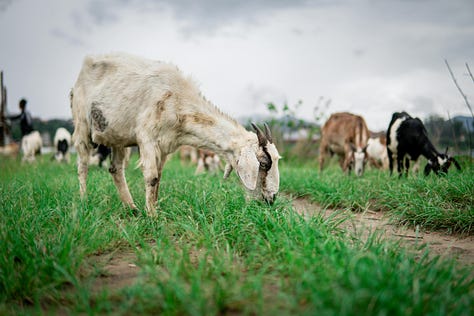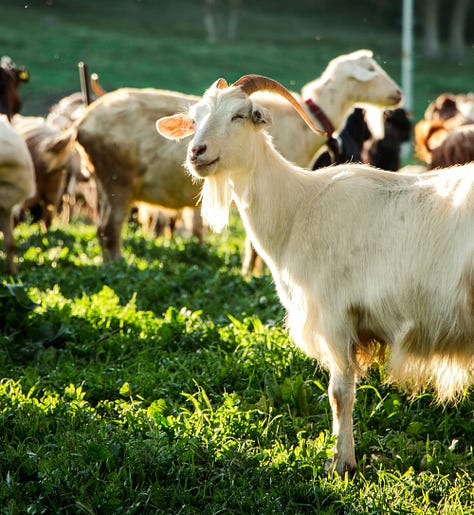Goats to the Rescue: Toronto's Innovative Approach to Invasive Plant Management
Harnessing Nature: Using Goats to Tackle Invasive Plants and Promote Urban Sustainability
In a groundbreaking move to address the persistent problem of invasive plant species, the City of Toronto is deploying an "eco-herd" of goats to Don Valley Brick Works Park (DVBW). An eco-herd is a group of goats specifically managed and utilized for ecological purposes, such as controlling invasive plants and promoting biodiversity.
This innovative pilot project, scheduled for June 25 and 26, aims to harness the natural grazing habits of goats to manage and control invasive plants in an environmentally friendly and sustainable manner.



A Natural Solution to a Persistent Problem
Invasive plant species such as garlic mustard, poison ivy, and wild parsnip have long plagued urban green spaces, outcompeting native flora and disrupting local ecosystems. Traditional methods of control, including chemical herbicides and mechanical removal, often come with significant environmental and economic costs. Enter the goats.
Goats are natural browsers, preferring to eat broad-leaved and woody-stemmed plants, making them ideal for tackling invasive species. Each goat can consume approximately seven pounds of vegetation daily, and a herd of 40 goats can clear an acre of vegetation in about three days. This method not only reduces the reliance on harmful chemicals but also minimizes soil disturbance and erosion, common issues with mechanical removal methods.
The Pilot Project
The Prescribed Goat Grazing Pilot Project at DVBW Park is the first of its kind in Toronto. The initiative involves a two-day intensive grazing session where the goats will be confined to a specific fenced-in area and monitored continuously to ensure their safety and effectiveness. The project is a collaboration between the City of Toronto, Goats in the City Inc., and the Toronto Field Naturalists, who will oversee the goats and report on the project's outcomes.
Public engagement is a key component of the project. Residents are invited to observe the goats in action from 10 a.m. to 8 p.m. on both days, with educational talks scheduled throughout the day to explain the benefits and processes of prescribed grazing.
Benefits Beyond Plant Control
The use of goats for invasive plant management offers several ecological and community benefits:
Biodiversity Enhancement: By reducing invasive species, goats help native plants regain a foothold, promoting greater biodiversity.
Soil Health Improvement: Goat grazing can enhance soil characteristics and nutrients, mimicking the natural processes of historical grazing herds.
Reduced Carbon Footprint: This method reduces the need for mechanical equipment, thereby lowering carbon emissions and noise pollution.
Community Engagement: The project provides an educational opportunity for the public to learn about sustainable land management practices.
A Model for Other Communities
Toronto's pilot project is part of a growing trend of using goats for ecological management. Similar initiatives have been successfully implemented in various parts of North America, including Wisconsin, Michigan, and New York. These projects have demonstrated that goats can be an effective, eco-friendly alternative to traditional invasive plant control methods.
For instance, in Wisconsin, goats have been used to manage buckthorn and honeysuckle, significantly reducing the need for herbicides and mechanical mowing. In Michigan, goats have helped restore native ecosystems by controlling overabundant invasive shrubs. These examples highlight the potential for other communities to adopt similar strategies, promoting sustainability and ecological balance.
Challenges and Considerations
While the benefits of using goats are clear, there are challenges and considerations to keep in mind. The effectiveness of goat grazing can be context-dependent, varying by geographic area and specific plant species. Additionally, long-term management plans are necessary to ensure that invasive species do not rebound after grazing sessions.
Moreover, the health and welfare of the goats must be prioritized. Goats can be susceptible to parasites and other health issues if not properly managed. Continuous monitoring and appropriate veterinary care are essential to the success of such projects.
Conclusion
The Prescribed Goat Grazing Pilot Project in Toronto represents a forward-thinking approach to urban ecological management. By leveraging the natural behaviors of goats, the city aims to control invasive species in a sustainable and community-engaging manner. If successful, this project could serve as a model for other urban areas facing similar ecological challenges, demonstrating the potential of integrating traditional ecological knowledge with modern urban management strategies.
As cities around the world grapple with the dual challenges of maintaining green spaces and managing invasive species, Toronto's innovative use of goats offers a promising path forward. This project not only addresses immediate ecological concerns but also fosters a deeper connection between urban residents and their natural environment, paving the way for a more sustainable and harmonious coexistence.
Ed Boks is a former Executive Director of the New York City, Los Angeles, and Maricopa County Animal Care & Control Departments. He is available for consultations. His work has been published in the LA Times, New York Times, Newsweek, Real Clear Policy, Sentient Media, and now on Animal Politics with Ed Boks.
Contact Ed Boks Consulting to help transform your organization's approach to animal welfare! With a proven track record in some of the largest animal control programs in the United States, Ed Boks offers unparalleled expertise in strategic planning, program development, and organizational efficiency. Whether you need help with capacity building, crisis management, or legislative lobbying, Ed Boks Consulting provides the innovative, compassionate solutions your organization needs to achieve and sustain success. Don't wait—reach out now to start making a life-saving difference! Contact Ed Boks Consulting at: animalpolitics8@gmail.com





The City of Montreal has been using grazing animals like sheep for almost 10 years. It is also common in Europe. There is truly nothing new or innovative about it, Ed. Toronto is just 10 years behind the curve. I know; I live here.
https://www.nationalobserver.com/2016/07/09/news/flock-sheep-take-over-landscaping-duties-montreal-park-summer
Always thank you for your insightful articles. Have written about the pros and cons of catios placed outdoors but connected to the main house? Do you have a couple resource links you recommend that I can research?